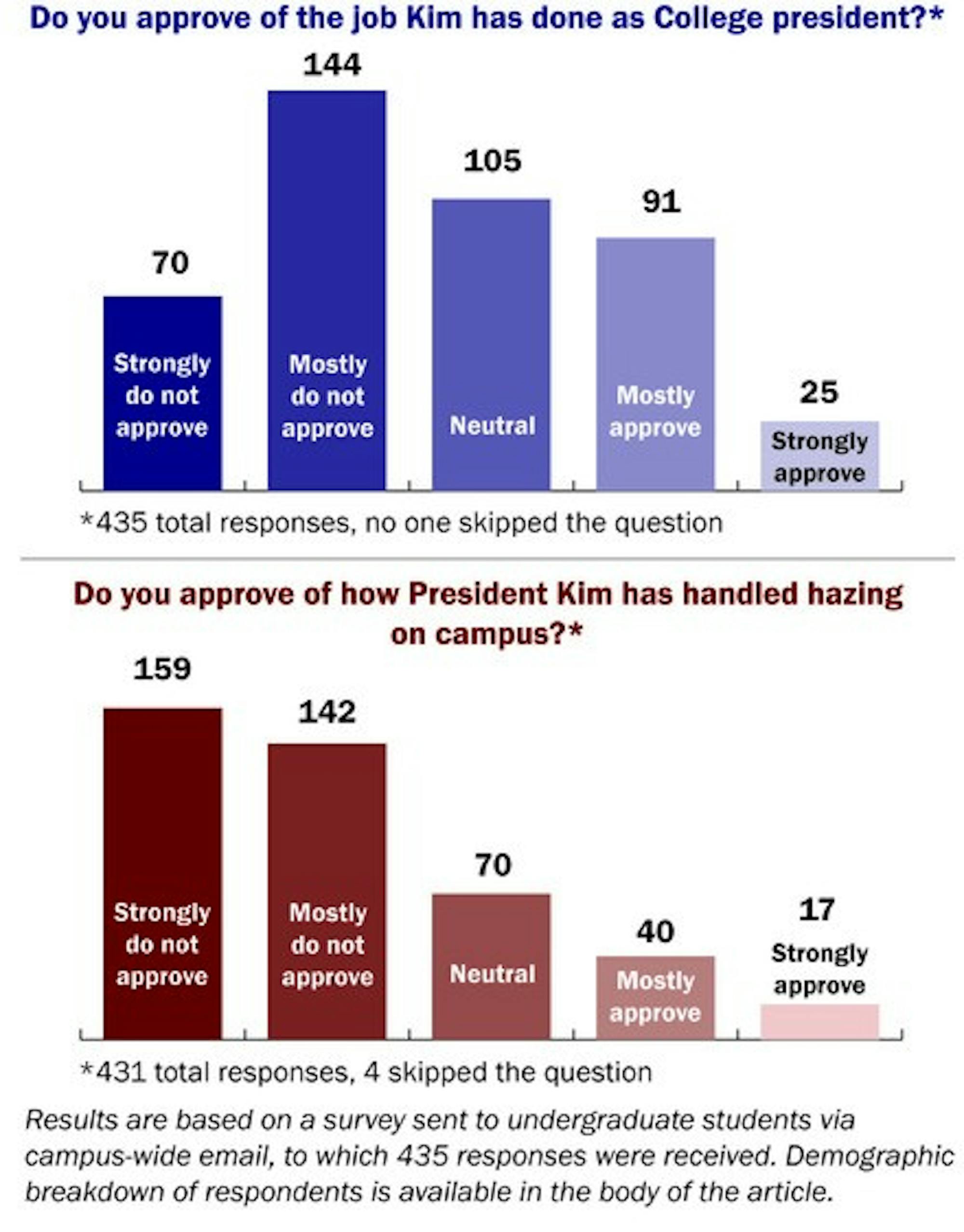Students reacted most negatively to Kim's response to hazing, with 70 percent of respondents indicating some level of disapproval. In addition, 51 percent of students said that they disapproved of how Kim has handled binge drinking-related issues, and 47 percent of students said that they disapproved of his response to issues of sexual assault.
Of the 435 respondents to the survey, sent to all undergraduates via a campus-wide email, 53 percent were men and 47 percent were women, nearly aligned with the makeup of undergraduate students at the College, at 51 percent male and 49 percent female. Respondents represented a number of class years, with 65 members of the Class of 2015, 106 members of the Class of 2014, 120 members of the Class of 2012, 111 members of the Class of 2012 and 33 members identifying as members of other classes. Members of Greek organizations made up 61 percent of respondents.
The survey consisted of seven questions about students' opinions of Kim's overall impact on campus; efforts to reduce binge drinking, hazing and sexual assault; handling of the budget; and the institution of new health care initiatives on campus. Respondents were able to indicate approval using a scale that included options labeled "strongly do not approve," "mostly do not approve," "neutral," "mostly approve" and "strongly approve."
Bishnu Panigrahi '12 said he was not surprised that Kim's actions toward student life issues garnered high rates of disapproval, and he said his own response to the survey mirrored this trend.
Panigrahi sited Kim's reaction to the claims of hazing at Sigma Alpha Epsilon fraternity in the winter as one reason for his own negative views.
"I really didn't like how he seemed like he was afraid to confront hazing," Panigrahi said. "I'm affiliated, and I really didn't like how Kim's administration handled the issues at SAE."
One member of the Class of 2012 who wished to remain anonymous due to her involvement with the Office of Pluralism and Leadership said she has been frustrated by Kim's lack of engagement with OPAL, which has resulted in greater stress on the advisors within the office.
"He's really been out of touch with the community," she said. "He's kept his focus very sports centered."
James Doernberg '15 said that while he is not looking for the new president to make a major cultural change on campus, he believes Kim has not made a large effort to confront student health issues.
"It's a bit bizarre that he came to campus with this strong public health background and hasn't really made a big impact," he said.
Emily Reeves '15 said she hoped the new president would be more visible and directly involved in responding to student issues on campus.
"It seems like Kim and [Dean of the College] Charlotte Johnson send out a lot of apology emails," she said. "I'm sure he's just a busy guy, but it reflects a trend in the way the administration handles things."
Overall, 49 percent of respondents said they either "strongly" or "mostly" disapproved of the "job that Kim has done as College president," compared to 27 percent that expressed some form of approval and 24 percent that identified as neutral.
Regarding Kim's overall impact on the College, 37 percent of respondents said they viewed it as either "very' or "somewhat" negative, while 29 percent remained neutral and 34 percent saw Kim as having a "very" or "somewhat" positive impact.
Daniel Oon '14 said he felt Kim's time at Dartmouth was characterized by inconsistencies.
"After the anti-gay graffiti slur in Fahey-McLane [residence hall], Kim never sent out an email to the community," Oon said. "But a couple days later he sent out an email to the community to remind people to vote for the Aires in the Sing-Off."
Kim also waited to send an email to the community about hazing until just prior to U.S. President Barack Obama's announcement that Kim was the United States' candidate for World Bank presidency, Oon said.
"I just didn't really feel like he has been as concerned with student welfare as he could have been," Oon said.
In response Kim's attention to the College's budget, 40 percent of students said that they approved of his actions, 19 percent indicated neutrality and 37 percent expressed disapproval.
Cirrus Foroughi '13 said he was glad Kim made a priority of eliminating the College's budget deficit, although the College's finances do not affect Foroughi on a daily basis.
"Having a balanced budget is a good thing and Kim was able to work with the Board of Trustees to turn it around quickly," Foroughi said. "I would hope that a new president would be more available though because it's really the Board that's in charge with running most of the College's finances."
Most students responded positively to the new health care initiatives that Kim has pursued on campus, including the Center for Health Care Delivery Sciences, although many students also remained neutral on the subject. Kim's efforts in this area received a 41 percent approval rate among respondents, and neutral responses accounted for 28 percent. More students 5 percent of respondents chose not respond to this question than any other of the survey's questions.
Steven Muenzen '14 said he hopes Kim's successor will remain at the College for a longer period of time.
"It feels like [Kim] used the job as a bit of springboard," he said. "Hopefully the new president will become more involved and stick around."




